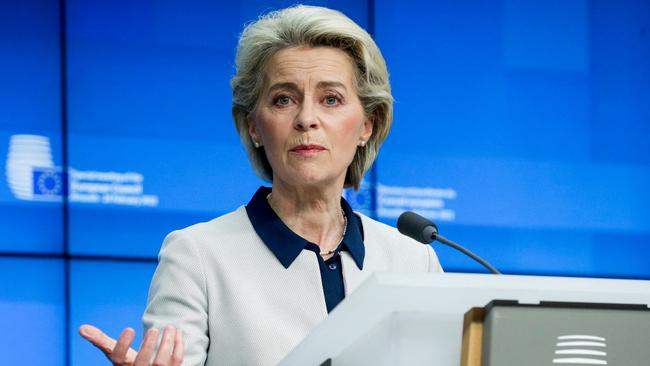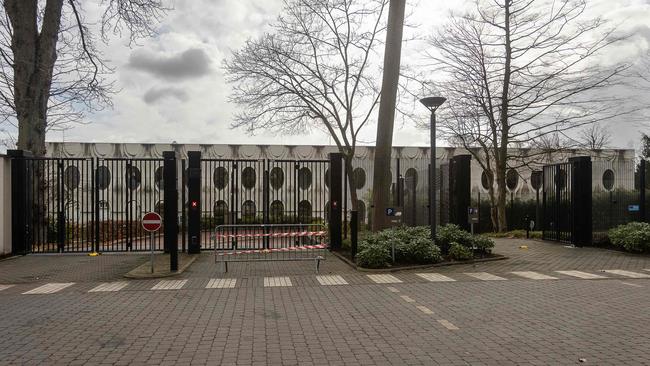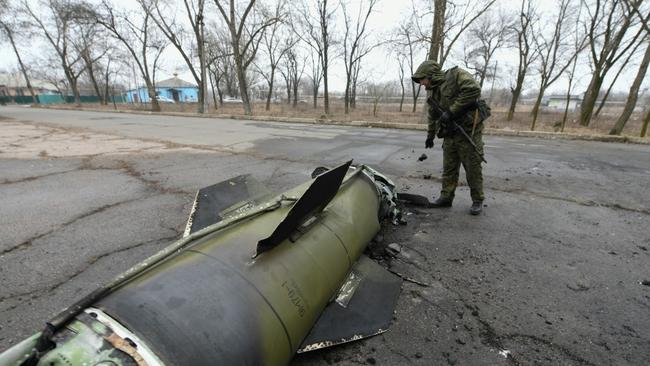SWIFT cut: Banks at heart of new Ukraine battleground
Global markets will be bracing for fallout as Russia is severely restricted from accessing global banks and cash reserves.

Business
Don't miss out on the headlines from Business. Followed categories will be added to My News.
Cutting off much of Russia from the plumbing that connects all the banks in the world from one another is the equivalent of delivering a smart bomb into the heart of Moscow’s financial heart.
After dragging their feet for several days, G10 nations including the US, European Union and the UK are now moving to restrict access to the SWIFT financial network for several Russian banks and critically preventing Russia’s central bank from moving more than $US620bn ($857bn) in foreign reserves around the world. This blocks Russia from accessing its own money supply, which could see it run out of cash in the short term given it will be spending more than it is bringing in.
However some Russian banks, yet to be named, will be allowed to remain on the global SWIFT payments system given the shockwaves it would also cause through Europe and energy markets to completely cut off Russia from the rest of the world.
Financial markets and some of Russia’s bigger European trading partners have been resisting such a move, but an escalation of Putin’s invasion against Ukraine has forced extreme financial pressure.

The Brussels-based SWIFT messaging service provides the secure network that connects more than 11,000 banks, including all Australian banks, and other financial institutions around the world.
While SWIFT prides itself as being country-neutral, the platform is directly overseen by the G10 central banks and being based in Brussels means it is bound by European rules. The Reserve Bank of Australia also sits on a broader SWIFT Oversight Forum, which monitors and provides input into the running of the platform.
SWIFT processes an average of 42 million “messages” per day, allowing banks to process secure international transactions between each other via a messaging system.
Limiting Russian banks from the network largely prevents international banks from doing business with them. This also cuts off Russian bank customers and businesses from the rest of the world.
Still, the move represents a nuclear option and will be felt widely through the financial system from bond to currency markets. Global exporters and crucially those providing counterparty and trade finance around energy exports will be preparing for a hit.
Australia’s homegrown investment bank Macquarie Group is also expected to be running the numbers over the implications of the move given it is a major player in trading and financing for European gas power and oil markets.
Given the potential for broader financial disruption it is highly unusual for banks to be delisted from the SWIFT platform.

Iran found itself locked out of the international banking system for years, which crippled its economy and severely crimped its ability to trade. It also starved the country of much-needed foreign investment before SWIFT started reinstating Iranian banks from 2016.
Given the bulk of Russia’s oil and gas is sold through mainland Europe, countries including Germany and Italy were holding off from kicking it off SWIFT. And until the weekend, the United States had resisted the move wanting to avoid a further sustained surge in energy prices.
The RBA is also expected to consider fallout from the Ukraine crisis when its board meets on Tuesday, although it is not expected to change its settings including ultra-low interest rates.
European Commission President Ursula von der Leyen said early on Sunday that Europe was committed to ensuring that “selected Russian banks” are booted from the SWIFT network.
“This will ensure that these banks are disconnected from the international financial system and harm their ability to operate globally,” she said in a statement. The US and Canadian governments also supported the move.
In addition, Von der Leyen said restrictive measures would prevent the Russian Central Bank from deploying its international reserves in ways that undermine the impact of sanctions. With more than $US620bn in foreign assets and much of this is in held in gold and euros this could also put pressure on both spot gold and currency markets.
While direct fallout from the SWIFT move will be minimal for Australia, reactions will be felt on global commodity markets. Complications for energy companies buying and selling Russian oil and gas as well as securing trade finance are likely to push Brent crude back above $US100 a barrel in coming days. This will be felt by drivers at the petrol pump with prices already above $1.90 a litre.

Last week Matt Halliday, the CEO of petrol refiner and distributor Ampol told The Australian that geopolitical tensions of Ukraine added additional tightness to “incredibly high oil prices”.
Many economies recovering from Covid combined with tight oil supplies and stocks around the world were also pushing up prices, Halliday added.
Over the weekend Australia also extended sanctions to a number of organisations including Russian state-owned bank Promsvyazbank, the Black Sea Bank for Development and Reconstruction and Crimea-based Genbank. This comes on top of a number of high-ranking Russian officials and businessmen being hit with global sanctions.
Australian trade with Russia is also minor. Domestic companies sold less than $1bn of mostly agriculture goods to Russia last financial year, while imports totalled $250m.
Russian banks have just $4m worth of claims on Australian banks, although the total exposure is believed to be much bigger with funds channelled through banks from Germany or from other parts of Europe. No Russian banks are licensed to operate in Australia, according to bank regulator APRA.
Cyber hit
Underscoring Russia’s links with Australia, one top executive with a big four Australian bank told this column that as tensions rose through the month, among his first calls was to his cybersecurity team, rather than to run the numbers over exposure to Russian banks or counterparties.
He made the call to the technology team again as the invasion took momentum on Thursday, underscoring the risks to the nation’s financial system is not through lending losses but from cyber attacks which could cripple banks.
So far there hasn’t been any unusually high traffic, he said, but the tightening of sanctions represents a pressure point with a DoS – denial of service attack – a real possibility for any of the major banks. This type of attack aims to flood systems and networks with traffic which makes it impossible to process normal transactions, potentially bringing the payments system to a halt.

Banking regulator APRA has also made cyber security a top priority and is implementing tougher rules to ensure banks and their boards ratchet up their defences.
The Covid pandemic opened up a major vulnerability around technology with many bank staff working from home. During the pandemic APRA put banks on notice to make sure any staff were equally protected from cyber attacks no matter where they were based.
The new cyber security standards also set out expectations how quickly a bank can recover after being hit by an attack.
Over the weekend the Australian government’s Australian Cyber Security Centre stepped up its warnings telling businesses to “urgently adopt an enhanced cybersecurity posture”. It cited the Russian-based ransomware group Conti as potentially targeting “unspecified critical infrastructure” if countries respond to Russia’s invasion of Ukraine with military action.
The Conti ransomware, which was first seen in 2020, is known for its role in extorting millions of dollars from mostly European organisations, including the Irish healthcare system, which have been crippled following attacks.
In late 2020 US software firm SolarWinds, which provides IT infrastructure monitoring, was hit with a major attack that compromised thousands of computer networks around the world. The Australian government joined a number of other countries around the world in blaming the attack on “Russian state actors”.
johnstone@theaustralian.com.au
Originally published as SWIFT cut: Banks at heart of new Ukraine battleground





